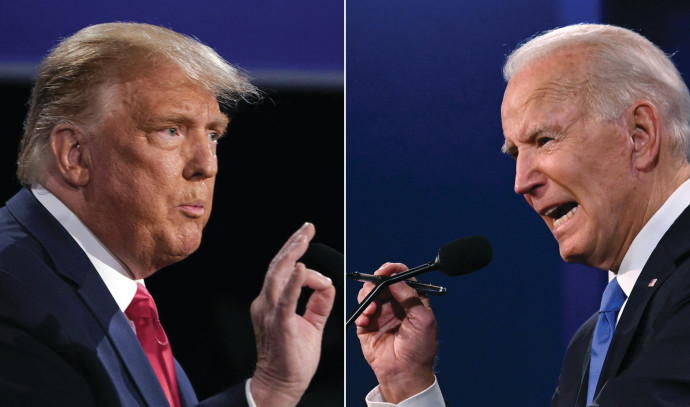American attitudes towards the region
An-Nahar, Lebanon, June 4
Last week, the Dubai Press Club held its 21st session, during which numerous issues were raised, including a symposium with two colleagues I contributed to, titled “The American Elections and Their Impact on the Arabs.” Given the nature of the symposium and the limited time, I could only present a few quick points, which I will elaborate on.
Firstly, it is both premature and misguided to predict who will win the elections. Historically, the unexpected often occurs. For instance, many doubted Barack Obama’s chances due to the color of his skin and his middle name “Hussein,” yet he won twice. Similarly, despite Hillary Clinton’s political experience, Donald Trump emerged victorious. Many expected Trump to secure a second term, but Joe Biden won instead.
Therefore, it’s crucial to approach such predictions with caution; Biden might win again, or Trump, or even an unforeseen third candidate could surprise us. Secondly, the American political landscape currently appears chaotic, marked by Trump’s legal battles and Biden’s perceived forgetfulness. It bewilders many that a great nation like the US seems to offer only these two men, each encumbered with significant liabilities.
In the context of international agreements, after the signing of the nuclear deal between the P5+1 and Iran in July 2015, Prince Bandar bin Sultan, an expert on American affairs, remarked, “America’s enemies should beware of it, but its friends should be more careful of it.” Former Egyptian president Hosni Mubarak echoed this sentiment, saying, “The one who relies on America for clothing may find himself naked,” reflecting the frustration with America’s political stance towards the Middle East.
The issue at hand is complex, not black and white. It is a multifaceted situation tied together by American interests. In the mid-1950s, the US opposed the tripartite aggression against Egypt, forcing its allies – France, Britain, and Israel – to withdraw from Sinai. However, with the fall of the Soviet Union and a partial shift away from oil dependence, US interests pivoted to Southeast Asia, neglecting the Arabs and the Gulf. A recurring perspective I maintain is, “You can disagree with America but not be hostile to it.”
The current contention revolves around America’s relationship with Israel. America’s stance is influenced by the historical context of the Jewish people, who are integrated into American and European societies and are influential in politics, trade, media, and science. The large Christian Zionist movement also significantly impacts political decisions.
The Gaza War exposed Israeli arrogance and its psychological drive rooted in historical fears of genocide. The loss of 1,200 Jews on Oct. 7 was perceived as the onset of genocide, prompting Israel’s disproportionate response, stirring emotions across America and Western capitals, and driving some to recognize a Palestinian state.
Today’s primary obstacle is the Palestine issue and the consequences of Oct. 7. This evolving situation reveals a noticeable rift between US and Israeli policies, particularly under Israel’s extreme Right-wing government. Palestinians must adeptly navigate the political process, leveraging European recognition of a Palestinian state as a foundation, akin to how the Zionist movement capitalized on the Balfour Declaration.
However, this will require overcoming internal divisions that hinder political progress. The lack of a robust Arab presence in the American political discourse creates a vacuum that others readily exploit.
Several countries, including Kuwait in the 1970s, attempted to bolster Arab advocacy by establishing the Arab American Society to unify Arab activists. However, this initiative only lasted for a period before fragmenting due to internal divides. Ultimately, whoever ascends to the White House is unlikely to deviate significantly from America’s core interests. While nuances in policy approach may vary, the overarching strategy typically aligns with long-standing national interests. The influence in America largely depends on the unity of the Palestinians and their steadfast pursuit of a two-state solution, free from internal politicking and grandstanding. To sum up, understanding the complexities of American policy, especially in relation to the Middle East, requires a nuanced perspective. It involves recognizing the shifts in geopolitical alliances, the interplay of domestic politics, and the pivotal role that historical ties and advocacy play. In such a volatile landscape, the voices and actions of all stakeholders – Palestinians, Arabs, Israelis, and Americans – remain crucial in shaping the future. – Muhammad Al-Rumaihi
Unconventional elections in America
Okaz, Saudi Arabia, June 5
A New York court has convicted Trump on charges related to hush money payments made to a porn actress ahead of the 2016 presidential election, which he went on to win. This development raises significant questions about Trump’s potential candidacy in the upcoming elections and whether these accusations will impede his path back to the White House. However, most legal experts assert that an American president can run for office and even assume the presidency despite a criminal conviction. Some analysts go so far as to suggest that this conviction might engender sympathy for Trump, potentially bolstering his chances in the next election.
The prevailing sentiment in Western countries is that Trump remains a formidable candidate in the upcoming election. The legal troubles he faces do not necessarily diminish his prospects; rather, they might propel him forward. Indeed, the former president has already garnered substantial financial support through donations collected following the court’s decision.
This predicament pales in comparison to the challenges faced by his Democratic opponent, President Joe Biden.
Biden is struggling to convince a majority of the American public that he possesses the physical and mental fortitude necessary to fulfill the duties of the presidency, especially given prevalent concerns about his age and cognitive abilities. These concerns are not merely speculative; they are substantiated by an official report issued by Special Counsel Robert Hur.
However, the issues plaguing President Biden are not limited to health-related perceptions. There is a deeper, more pressing problem: Statistics indicate that half of Democrats favor replacing Biden with another candidate capable of challenging Trump. Additionally, the progressive Left wing of the Democratic Party strongly opposes many of Biden’s policies, particularly regarding the Gaza conflict and unwavering support for Israel. These factors collectively cast a shadow over the Democratic president’s prospects.
While the US political landscape remains unpredictable, with all options seemingly on the table, the situation is viewed differently outside the US. Across the Atlantic, there is significant anticipation of Trump’s possible return to power, with European countries bracing for the substantial shifts in American policy towards the Old Continent that such a development would bring.
European nations are already adjusting their strategies in response to a potential re-adoption of Trump’s policies by the US, especially in the context of the war in Ukraine and the notable relationship between Russian President Vladimir Putin and Trump, which could lead to a shift in Western policy towards Moscow and potentially even a cessation of American support for Kyiv. This would place immense pressure on Europe. In this vein, French President Emmanuel Macron has made it clear to Russia that France might deploy soldiers to Ukraine, preparing for any shift in American policy that could alter the ongoing conflict against Moscow.
Trump has undeniably left an indelible mark on the political history of the US, and whatever the outcome of the upcoming election, it promises to be anything but conventional, potentially bringing profound and unexpected change to the nation, reshaping American politics in ways that are difficult to predict.
– Rami Al-Khalifa Al-Ali
Two lessons from the Gaza war
Al-Ahram, Egypt, June 6
The lessons of war are typically absorbed after its conclusion when the victor is distinguished from the loser. However, understanding these lessons now may be sufficient to halt the ongoing Gaza war, alleviate continuous suffering, and preserve the aspirations of future generations.
The foremost lesson is that the Palestinian people steadfastly remain on their land. This enduring Palestinian reality manifests through acts of intifada, armed resistance, or other forms of disruption against Israel, making their lives increasingly challenging. Regardless of the circumstances, Palestine remains integral to Arab and Islamic pride and the geopolitical fabric of the region – elements that cannot be compromised. Conversely, the Israeli truth is equally persistent.
The Jews who settled in Palestine were unlike the Crusaders or European colonialists; they did not arrive in a fleeting raid that ignited with force only to dissipate with weakness or the advent of new powers.
Contemporary evidence shows that the global community, including major powers, consistently upholds the existence of Israel as a state and continually supplies it with weapons and technology to maintain its nuclear and conventional superiority over its neighbors. The two-state solution has been proposed since the 1947 partition resolution, and nations engage with it based on mutual or conflicting interests.
Introducing religion into this equation shifts the focus from pragmatic human concerns to the afterlife, a realm where agreement and consensus are elusive.
The rise of Hamas in the 1980s, sharing the ideology of the Muslim Brotherhood, along with the rise in power of messianic Jews during the same period, complicated peace efforts, made compromise impractical, and relegated development to a distant dream. When these groups receded, the Oslo negotiations brought forth the initial framework for a solution, although their methods presaged a succession of wars. The two-state solution remains the closest to a realistic humanitarian resolution, despite the appeal of an “ideal” one-state solution or the perceived practicality of a confederation solution. Historically, war has opened new avenues for life instead of death, fostered construction over destruction, and promoted coexistence instead of antagonism. – Abdel Moneim Saeed
The only opportunity to end the war in Gaza
Al-Bilad, Bahrain, June 6
A coalition of influential Arab nations has acted responsibly in response to US President Joe Biden’s proposal to halt the conflict in the Gaza Strip, implementing a multiphase plan that aims to establish a permanent ceasefire and initiate the reconstruction process of the Gaza Strip.
In a joint statement, Saudi Arabia, the United Arab Emirates, Egypt, Jordan, and Qatar emphasized the importance of engaging seriously and positively with Biden’s proposal to secure a lasting ceasefire and ensure the adequate delivery of aid throughout the Gaza Strip, thereby alleviating the suffering of its residents.
Since Oct. 7, the foreign ministers of these five countries have been engaged in diligent diplomatic efforts to end the human suffering in Gaza. Their goal is to propose a realistic solution that leads to a permanent resolution and a credible path for the peace process, ultimately resulting in the establishment of an independent Palestinian state with east Jerusalem as its capital. They argue that temporary solutions not rooted in legal frameworks will only have limited international impact and will delay, rather than prevent, a major confrontation in the future. It is in this context that one can understand the insistence of these nations to foster international political-diplomatic support from influential global capitals for the two-state solution.
In line with these efforts, there was a phone call between US Secretary of State Antony Blinken and Saudi Foreign Minister Prince Faisal bin Farhan. During the call, Prince Faisal reiterated “the kingdom’s support for all efforts aimed at an immediate ceasefire, the complete withdrawal of Israeli occupation forces from Gaza, and the provision of urgent humanitarian aid to civilians.”
Meanwhile, UAE Foreign Minister Sheikh Abdullah bin Zayed published a statement emphasizing the importance of releasing prisoners and hostages and alleviating the dire circumstances faced by civilians in Gaza.
He stressed that “a comprehensive solution can only be achieved through peace and negotiations in accordance with the two-state solution.”
These initiatives spearheaded by the Arab quintet deserve global support, and it is imperative that both Israel and Hamas respond constructively. War does not foster prosperity or security; only a reliable peace process can end the human suffering in Gaza, allowing both Palestinians and Israelis to live safely. The vision is for two neighboring states that compete in areas like culture, economics, science, technology, and sports, not through war and destruction. – Hassan Al-Mustafa
Translated by Asaf Zilberfarb.







